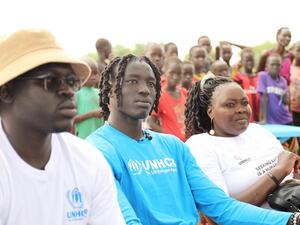UNHCR renews call for protection of displaced people after attack on CAR convoy
UNHCR renews call for protection of displaced people after attack on CAR convoy

This group of displaced people are living in a school in the town of Bossangoa but remain at risk, like some 15,000 other Muslims in surrounded sites.
BANGUI, Central African Republic, April 29 (UNHCR) - The UN refugee agency on Tuesday stressed the need to provide physical protection to forcibly displaced communities a day after a fatal grenade attack on a humanitarian convoy.
The convoy, carrying members of the Muslim community to safety in Kabo and Moyen Sido in the north, was hit by a grenade believed to have been thrown by an Anti-Balaka militiamen. The attack, which occurred at Dissikou, left two people dead and six injured.
"UNHCR condemns the attack and offers its condolences to the victims' families. It underscores the need to provide physical protection to displaced communities at risk," spokesperson Fatoumata Lejeune-Kaba told journalists.
The 18-truck convoy was moving 1,300 people previously trapped in the troubled PK12 neighbourhood of the capital, Bangui. They had fled to PK12 to escape inter-communal violence that has been tearing apart the country since December 2013. However, PK12 later came under threat, leaving the displaced living in constant fear of attacks without enough food and in squalid conditions because of lack of sanitation facilities.
Taking into account their request to be moved to safer areas and given the imminent and serious threat to their lives, the UN humanitarian country team organized their relocation on Sunday. The operation was decided as a measure of last resort, under the leadership of Senior Humanitarian Coordinator Claire Bourgeois.
The convoy spent Sunday night near Sibut, before continuing its three-day journey. On Monday, despite the attack, it was able to continue to Kaga Bandoro, where people injured in the attack received medical assistance. A UNHCR team accompanying the convoy reported that three babies have so far been born during the journey.
This was the second relocation operation from PK12, following the movement of 93 people, including 35 children, to Bambari on April 20. "UNHCR participated in the operations in view of our commitment to promote the human rights of all the internally displaced, particularly the right to physical security, irrespective of their community background. UNHCR is committed to savings lives and alleviating the plight of all the displaced and to work with the government to that end," Lejeune-Kaba said.
There are currently more than 600,000 internally displaced in the Central African Republic, including above 15,000 Muslims who remain at risk. They are surrounded and threatened by militiamen in 15 locations across the western part of the country.
UNHCR and its partners are supporting mediation efforts to allow for co-existence. Such efforts have already produced some positive results in areas like Bouboua, where people recently returned from the bush where they had sought shelter. UNHCR and other members of the humanitarian community are looking to reinforce these tendencies, with a clear focus on paving the way for the return of those who have relocated, those who remain displaced in CAR, as well as for the more than 348,000 refugees who fled to neighbouring countries.








